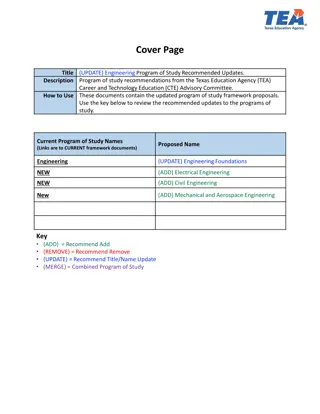Engineering Strategies for Handling COVID-19 in Nigeria
Coronaviruses cause respiratory tract infections in humans, with symptoms such as fever, cough, and breathing difficulties. Environmental health practices are crucial in preventing illness while economic stability is essential for sustainable growth. Creating safe living environments with clean air, water, and food is vital for overall well-being.
Download Presentation

Please find below an Image/Link to download the presentation.
The content on the website is provided AS IS for your information and personal use only. It may not be sold, licensed, or shared on other websites without obtaining consent from the author.If you encounter any issues during the download, it is possible that the publisher has removed the file from their server.
You are allowed to download the files provided on this website for personal or commercial use, subject to the condition that they are used lawfully. All files are the property of their respective owners.
The content on the website is provided AS IS for your information and personal use only. It may not be sold, licensed, or shared on other websites without obtaining consent from the author.
E N D
Presentation Transcript
ENGINEERING STRATEGIES FOR HANDLING COVID-19 FOR ENVIRONMENTAL HEALTH AND ECONOMIC SUSTAINABILITY IN NIGERIA BY ODUNEYE LEONARD MOYOSOREOLUWA 17/ENG02/061 COMPUTER ENGINEERING
INTRODUCTION Coronaviruses are a group of related viruses that cause diseases in mammals and birds. In humans, coronaviruses cause respiratory tract infections that can be mild, such as some cases of the common cold (among other possible causes, predominantly rhinoviruses), and others that can be lethal, such as SARS, MERS, and COVID-19. Symptoms in other species vary: in chickens, they cause an upper respiratory tract disease, while in cows and pigs they cause diarrhea. There are yet to be vaccines or antiviral drugs to prevent or treat human coronavirus infections.
What are the symptoms of someone infected with a coronavirus? It depends on the virus, but common signs include respiratory symptoms, fever, cough, shortness of breath, and breathing difficulties. In more severe cases, infection can cause pneumonia, severe acute respiratory syndrome, kidney failure and even death.
WHAT IS ENVIRONMENTALHEALTH? Environmental health is the science and practice of preventing human injury and illness and promoting well-being by identifying and evaluating environmental sources and hazardous agents and limiting exposures to hazardous physical, chemical, and biological agents in air, water, soil, food, and other environmental media or settings that may adversely affect human health.
ECONOMIC STABILITY Economic stability refers to an absence of excessive fluctuations in the overall economy. An economy with constant output growth and low and stable price inflation is likely to be regarded as stable. An economy with frequent boom-bust cycles and variable price inflation would be considered as unstable.
We need safe, healthy and supportive environments for good health. The environment in which we live is a major determinant of our health and wellbeing. We depend on the environment for energy and the materials needed to sustain life, such as: -clean air -safe drinking water -nutritious food -safe places to live.
The Coronavirus (COVID-19) has resulted in mass production shutdowns and supply chain disruptions due to port closures in China, causing global ripple effects across all economic sectors in a rare twin supply-demand shock . With South Africa having just reported its first cases of COVID-19, Africa is beginning to feel its full impact and plans to control and manage the humanitarian challenges of the virus are underway across the continent. Economically, the effects have already been felt demand for Africa s raw materials and commodities in China has declined and Africa s access to industrial components and manufactured goods from the region has been hampered. This is causing further uncertainty in a continent already grappling with widespread geopolitical and economic instability.
On 30 January 2020, the World Health Organization (WHO) declared the 2019 20 coronavirus outbreak a Public Health Emergency of International Concern (PHEIC) and a pandemic on 11 March 2020. Local transmission of the disease has been recorded in many countries across all six WHO regions.
Another big hit to the economy and perhaps, the most direct hit will come from the restrictions on movement around the world and in Nigeria. The shutdown of offices and non-essential businesses will reduce productive effort and output. Take as examples, the closure of a Chinese fabric manufacturing company that produces input for a Nigerian fashion line or the shutdown of bars in Lagos. In both cases, Nigerian businesses will be required to slow down or halt production. Moreover, with stay-at- home policies and the uncertainty that comes with the pandemic, non-essential commodities will be less sought after.
CHALLENGES The effect of this development on the Nigerian economy could be significant. The last major crash in the price of crude oil in 2014 precipitated the downturn in the nation s economy, culminating in a recession. Thus, there are reasonable fears that a sustained period of low oil prices could send the nation s economy spiralling into another downturn. This is quite worrying given that since the 2014 slump in global oil prices, the Central Bank of Nigeria (CBN) has rolled out a string of policies geared towards maintaining an artificially strong Naira reliant upon high crude oil prices and external borrowings. Thus, if crude oil prices remain in the $40-range for an extended period of time or drop even further, there could be even more pressure on the already pressured exchange rate and the nation s overall economy.
Another big hit to the economy and perhaps, the most direct hit will come from the restrictions on movement around the world and in Nigeria. The shutdown of offices and non-essential businesses will reduce productive effort and output. Take as examples, the closure of a Chinese fabric manufacturing company that produces input for a Nigerian fashion line or the shutdown of bars in Lagos. In both cases, Nigerian businesses will be required to slow down or halt production. Moreover, with stay-at-home policies and the uncertainty that comes with the pandemic, non-essential commodities will be less sought after.
Another risk posed by the COVID-19 pandemic to the Nigerian economy is the likelihood that the nation s already high inflation rate could rise even further. Given that China accounts for about a quarter of Nigerian imports, greasing much of the country s supply chain; and that the nation is reliant on China for raw materials, inputs and machinery utilized in local production, there is a significant possibility that the pandemic could induce an increase in the cost of local production or at least a significant reduction in the already limited local production capacity.
RECOMMENDATION 1. Adequately support the healthcare system: Prior to COVID-19, healthcare institutions were already overburdened with many ailments given poor medical supplies, shortage of medical workers and poor infrastructure. 2. Perhaps most importantly, there is a need to address the biggest elephant in the room: Nigeria s reliance on the sale of crude oil as the major source of the nation s foreign exchange earnings. There is a need to diversify the nation s economy away from a reliance on crude oil. The need to restructure and diversify the productive base of the economy, with a view to reducing
dependence on the oil sector and imports has never been more apparent. As long as the Nigerian economy remains a mono-economy totally dependent on oil revenues, the nation will continue to remain vulnerable to oil price shocks. Therefore, Nigeria needs to ensure sustainable fiscal management that is resilient to global oil price cycles. 3. Provide incentives and safety nets to the most affected: Through targeted tax incentives, social transfers, and regulatory support, the Nigerian government could help minimize the impact of COVID-19 on the most vulnerable businesses and citizens.
CONCLUSION Economic sustainability awareness and sustainability policies are recommended in order to increase interest and implementation of sustainability in our Nigerian industries. Development and implementation of sustainability strategies will foster achievement of the green growth agenda in Nigeria. The strategies and solutions given in the paper will definitely help to bolster the growth of the economy.
This is evident in the absence of relevant laws and regulations to drive sustainability especially in the construction sector. Inadequate support for sustainable construction by leaders of construction organizations also militates against the development and implementation of sustainable construction. This could be because the concept is not well understood. The major perceived benefit of sustainable construction is that sustainable construction improves organizations environmental sustainability. Respondents view sustainability more in terms of environmentally sustainability. This may be because of greater emphasis on environmental sustainability than economic or social sustainability.
This could be because the concept is not well understood. The major perceived benefit of sustainable construction is that sustainable construction improves organizations environmental sustainability. Respondents view sustainability more in terms of environmentally sustainability. This may be because of greater emphasis on environmental sustainability than economic or social sustainability.























